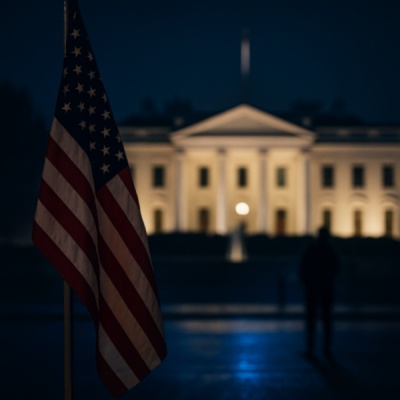LEIA, COMENTE, COMPARTILHE
Há episódios na história que não são apenas fatos, mas sinais. O tiroteio desta noite, no coração político dos Estados Unidos, não será lembrado apenas como mais um ato de violência. Será visto como um divisor silencioso entre o que o país era ontem e o que pode se tornar amanhã.
Dois militares feridos a metros da Casa Branca significam mais do que balas e sirenes. Significam o choque direto entre a ordem institucional e a inquietação que insiste em crescer sob a superfície americana.
Mesmo sem manifesto, sem reivindicação e sem bandeira hasteada, o ataque fala. Ele expõe uma tensão que vinha respirando fundo, acumulando força e esperando uma faísca. É o retrato de um debate que já ultrapassou o campo técnico e tornou-se disputa pública: militarização interna, confiança fragilizada nas instituições, segurança transformada em campo de batalha político.
Neste momento, pouco importa a identidade emocional do agressor. Importa o que o gesto revela.
Amanhã haverá quem enxergue no ataque a necessidade de mais força nas ruas. Haverá quem veja exatamente o contrário, afirmando que a força deixou de proteger e passou a provocar. E haverá aqueles que, com razão, temem que o debate não seja mais sobre segurança, mas sobre poder, narrativa e controle.
Entre manchetes apressadas, declarações cautelosas e um público dividido entre medo e cansaço, surge uma certeza desconfortável. Os Estados Unidos acordam não perguntando quem apertou o gatilho, mas o que está sendo atingido.
Talvez o verdadeiro alvo não tenha sido a Guarda Nacional. Talvez tenha sido o próprio conceito de estabilidade democrática. Porque quando símbolos são feridos, um país inteiro sente. E quando a segurança ao redor do poder treme, o sistema deixa seu equilíbrio e entra em alerta.
O amanhã dependerá menos do que ocorreu e mais do que for dito e feito a partir deste ponto.
Há momentos em que a história acena. E há momentos em que ela adverte.
Este não foi um aceno.
Foi um aviso.
Between today and tomorrow.
There are moments in history that are not merely events, but signals. The shooting tonight, in the political heart of the United States, will not be remembered simply as another act of violence. It will stand as a quiet dividing line between what the nation was yesterday and what it may become tomorrow.
Two uniformed servicemen wounded just steps from the White House represent more than gunfire and flashing lights. They are the moment where institutional order meets a growing restlessness beneath the American surface.
Even without a manifesto, without a stated motive, and without a flag raised over the act, the attack speaks. It exposes a tension that has been breathing deeply, gaining pressure, and waiting for a spark. The debate over domestic militarization, the erosion of public trust in institutions, and the transformation of public safety into political terrain has now crossed a boundary.
At this moment, the identity of the shooter matters less than what the action reveals.
Tomorrow some will point to the attack as proof that stronger force is needed in the streets. Others will argue the opposite, saying that force has become a trigger instead of a shield. And there will be those who fear, rightly, that the dispute is no longer about safety, but about power, narrative, and control.
Between rushed headlines, cautious authorities, and a divided public, one unsettling certainty emerges. The United States wakes not asking who pulled the trigger, but what is being struck.
For the true target may not have been the National Guard, but the very concept of democratic stability. Because when national symbols are wounded, the country feels it. And when security around the seat of power trembles, the entire system shifts from balance to alert.
Tomorrow will depend less on what happened and more on what is said and done from now on.
There are moments when history waves.
And there are moments when it warns.
This was not a wave.
It was a warning.



Li e refleti, noticia que assusta principalmente avaliando o objetivo que o atirador queria atingir!